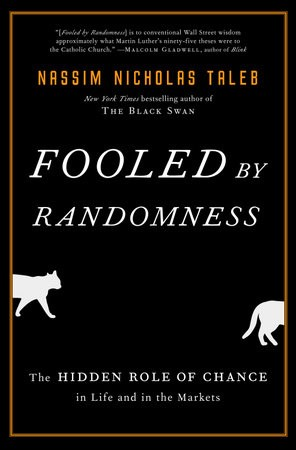
Fooled by Randomness: The Hidden Role of Chance in Life and in the Markets by Nassim Nicholas Taleb
There are professions with low randomness (e.g. dentist) that can only be successful with skill; and professions with high randomness (e.g. day trader) that could see someone unskilled get successful purely based on luck and variance.
People often mistake luck and variance for skill, i.e. survivor-ship bias.
The absence of evidence is not evidence of absence. Just because we have only encountered white swans so far, doesn’t mean that all swans are white. It only takes one black swan to prove the hypotheses wrong.
The scientific method can only assess falsifiable hypotheses. Good hypotheses can be proven wrong quickly, like by a single black swan.
Theory of evolution postulates survival of the fittest, not the best. Sometimes things that survive the longest is the sub-optimal choice, e.g. QWERTY keyboard.
Nature and life are non-linear. We can build a sandcastle with a million grains of sand, yet adding another would bring the whole thing down.
The human mind is not evolved to handle sophisticated statistics and randomness. We depend on heuristics, e.g. availability heuristics where we value things that are easily visible more.
The heuristics cause us to attribute the wrong thing as a cause. e.g. our success is caused by our skills, but failure is bad luck
We are driven by emotion which helps us to make a quick decision, even though it is sub-optimal. Emotion influences our rational thinking rather than the other way around.
It is a lot easier to find ways to avoid triggering emotion rather than try to fight it; e.g. checking share portfolio once a month instead of daily to avoid impulse sale.
Hindsight bias is another big one that we need to be aware. Past events always seem predictable and easier to handle than they were at the time. We naturally find patterns where there were none.
Overfitting is when we try to find pattern, rule or formula to fit historical data too much that it becomes less able to predict future events.
We need to account for an unexpected event (black swan event). e.g. stock market crash and climate change.
Look for both chance and magnitude of an event. e.g. 99.9% chance of winning $1 with 0.1% chance of losing $10,000 looks good on paper, but the expected outcome is a loss of ~$9.
Too often we only looked at the chance and not enough of the magnitude. Rare events could be catastrophic.
Embrace beautiful randomness, e.g. poetry, art.
Stoicism philosophy is a great way to deal with randomness. We do not control randomness, but we manage our reaction to it. Expect it, don’t complain or blame. Face variance with dignity and wisdom.
Reading daily news takes a lot of effort for little reward. Therefore we should stop doing it. If the news is essential, it will travel through the grapevine to reach you somehow.
Same goes for checking portfolio every minute. We might be affected by small variance and let our emotion take over.
Learn the Monte Carlo simulation. I found this great website to visualize portfolio return. The website also have plenty of examples to play around.


